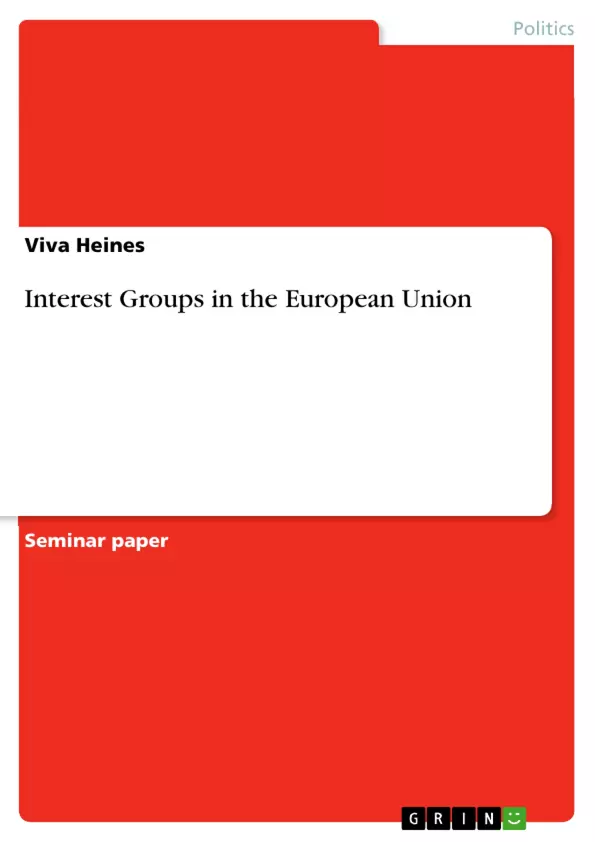This paper asks, whether interest groups participation enhance the democratic quality of supranational policy making or deteriorate it. Firstly, it will be pointed out how the European policy process is structured, and which institutional organs are involved. Therefore, it will be stated where and how interest groups can effectively influence these institutions and how the interaction between lobbyists and EU-officials is regulated. In a next step, it will be explained what kind of interest groups particularly interact on the EU-level and why they spend so much money on their lobbyism work. Thereby, the advantages and disadvantages of lobbyism in the European Union will be weighted. Finally, improvements for more equality and transparency in the lobbyism context will be presented.
Limits for air pollution in our cities, the approval of chemicals in everyday objects such as baby bottles or the protection of data on the internet: The laws of the European Union have a large and direct impact on all citizens in the member states of the European Union. Consequently, there are a lot of stakeholders who try to influence the European legislation. Recently 948 industry associations, 645 companies and company groups, 444 lobbyist agencies and estates, 244 labor unions and 454 non-governmental organizations are in Brussels to influence the European policy making process. There are approximately 3 lobbyists per parliamentarian in the capital of the European Union. Therefore, Brussels behind Washington D.C. has the second highest lobbyists density in the world. These high numbers explain why a lot of people call lobbyists the "fifth power".
However, the European legislative process is regularly judged to have a lack of transparency and to be very complex because of the many different decision-making-levels and partners involved. That’s why the word "lobbyist" often has a bad connotation and is connected with one-minded representation of industrial interests, with legislation made in back rooms or even with corruption. But contrary, lobbying contributes to the variety of opinions and within fulfills the pluralism of opinions and views in the political dialogue.
Inhaltsverzeichnis (Table of Contents)
- Introduction
- The European policy making process and the power of the legislative organs
- Lobbyism in Brussels
- Conclusion
Zielsetzung und Themenschwerpunkte (Objectives and Key Themes)
This paper examines the impact of interest group participation on the democratic quality of European Union policy making. It explores the structure of the European policy process, the influence of interest groups on various institutions, and the advantages and disadvantages of lobbying within the EU context. The paper also proposes improvements for greater equality and transparency in lobbying practices.
- The influence of interest groups on the European policy making process
- The democratic quality of EU policy making in the context of interest group participation
- The role and structure of the European legislative organs
- The regulation of interactions between lobbyists and EU officials
- The advantages and disadvantages of lobbying in the EU
Zusammenfassung der Kapitel (Chapter Summaries)
- Introduction: This chapter provides an overview of the EU policy making process and highlights the significant influence of interest groups. It also introduces the key question: Does interest group participation enhance or deteriorate the democratic quality of EU policy making?
- The European policy making process and the power of the legislative organs: This chapter details the structure of the European legislative process, focusing on the Council of the European Union, the European Parliament, and the European Commission. It explains how these organs work, how they can be influenced by interest groups, and the regulations they are subject to.
Schlüsselwörter (Keywords)
The key themes of this paper are the democratic quality of EU policy making, interest group participation, lobbyism, transparency, regulation, and the European legislative process. The paper examines the impact of interest groups on the Council of the European Union, the European Parliament, and the European Commission. It also explores the role of national and European regulations in governing lobbying activities.
Frequently Asked Questions
How many lobbyists are currently active in Brussels?
There are approximately 3 lobbyists for every member of parliament in Brussels, making it the city with the second-highest lobbyist density in the world after Washington D.C.
Which groups try to influence EU policy making?
Stakeholders include industry associations, individual companies, lobbyist agencies, labor unions, and non-governmental organizations (NGOs).
Does lobbying improve or harm EU democracy?
The paper discusses both sides: while it can fulfill pluralism and provide expertise, it is often criticized for a lack of transparency and favoring industrial interests.
Which EU institutions are the main targets for interest groups?
Lobbyists primarily target the European Commission, the European Parliament, and the Council of the European Union.
Why is lobbying sometimes called the "fifth power"?
Due to the high number of lobbyists and their significant impact on complex legislation, such as air pollution limits or data protection, they are seen as a powerful political force.
What improvements are suggested for EU lobbying?
The paper presents suggestions for more equality of access and increased transparency to ensure a fairer legislative process.
- Citation du texte
- Viva Heines (Auteur), 2019, Interest Groups in the European Union, Munich, GRIN Verlag, https://www.grin.com/document/506488



